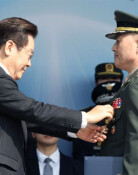China's biggest bank freezes N. Korean accounts
China's biggest bank freezes N. Korean accounts
Posted February. 22, 2016 07:15,
Updated February. 22, 2016 07:19
It has been confirmed that some Chinese banks in northeastern China, including the Dandong, Liaoning Province branch of Industrial and Commercial Bank of China (ICBC), the country's largest bank, have suspended cash deposit and transfer services for accounts owned by North Koreans since December last year. The effectuation of new and tougher U.S. sanctions on North Korea on Thursday will likely affect Chinese businesses and financial institutions ever more.
In telephone conversations with the Dong-A Ilbo on Thursday and Friday last week, an employee of ICBC's Dandong branch said that the measures started in late December, adding that the bank had suspended all deposits and transfers of foreign currencies, including the Chinese yuan, in and out of those accounts. Dandong is located in a border area with North Korea. More than 70 percent of North Korea-China trade takes place in the city.
A source quoted a Chinese entrepreneur in Shenyang, Liaoning Province as saying that a Chinese bank he was doing business with recently informed him that it would not take deposits in or make cash transfers from North Korean accounts. The businessman, who invested in several mines in North Korea, had paid for minerals from the mines imported to China through the bank. His North Korean partner is urging him to send money quickly, according to the source.
In December 2015, before the North's four nuclear test conducted on January 6, Beijing said it had not been informed by Pyongyang of the test. "(The bank) had never told me why it was taking such measures, but it seems that they are related with the strained relations between North Korea and China," an employee at the bank said.
One North Korea expert said that the Beijing-Pyongyang relations were worsened after the North's Moranbong Band canceled its first overseas concert in Beijing and returned home on December 12. "After the Chinese government started some measures to put pressure on Pyongyang, it could have further expanded and strengthened the sanctions following a series of provocations such as the nuclear test and the missile launch (February 7)," the expert said. It is possible that Beijing, which participated in some of the international sanctions on the North following the third nuclear test in February 2013, has broadened the scope its sanctions on the North.
Chinese companies operating plants in the border area and employing North Korean workers are restless, as the U.S. and South Korea have cut off Pyongyang's financial sources for the nuclear and missile development by the U.S. sanctions law and the shutdown of the Kaesong Industrial Complex.
"If we trade minerals with North Korea and make transactions of the United Nations-designated contraband goods, our business will be hit hard by the U.S. sanctions law," another Chinese businessman said. "Many entrepreneurs are worried because their major importers such as the U.S., Europe and South Korea will likely block imports of Chinese products manufactured by North Korean employees."
단둥=구자룡특파원 bonhong@donga.com




![지하철 타고 가는 북한산성…외국인도 반한 ‘K등산 맛집’[전승훈 기자의 아트로드]](https://dimg.donga.com/c/138/175/90/1/wps/NEWS/IMAGE/2026/01/10/133120824.1.jpg)


